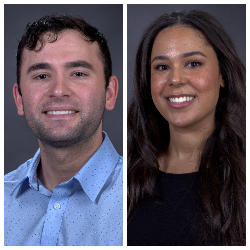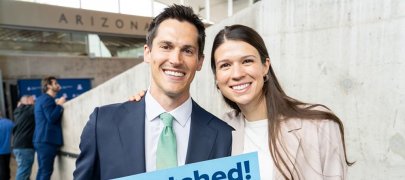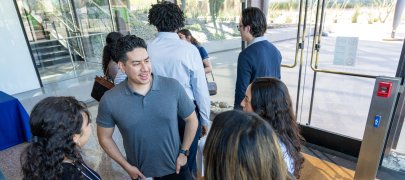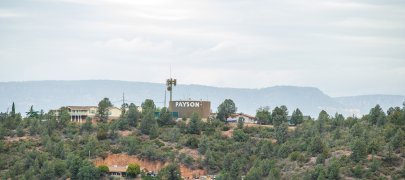Native Tuition Scholarship Awarded to Two Pathway Scholars Students
Two Native American medical students of Cherokee heritage received the Native Tuition Scholarship this year.
Trevor Helton and Kiera Vaughn, both Pathway Scholars students at the University of Arizona College of Medicine – Phoenix, were the recipients.
In 2021, the Arizona Community Foundation generously donated a $306,000 grant to the College of Medicine – Phoenix to prepare nine Native American students to succeed in medical school.

Native American people represent less than 0.4% of the total amount of physicians practicing in the United States. This number is disproportionate to the approximately 3% of people who identify as American Indian or Alaska Native.
Vaughn spent most of her life in Oklahoma and finished her undergraduate education at the University of Central Oklahoma, majoring in biomedical science.
“As a mom of two, I appreciate all of the support that is offered to me,” Vaughn said. “Having this scholarship has allowed me the opportunity to focus on school without having to work full time to provide for my family.”
Vaughn’s primary goals in medical school are to make good connections, learn as much as she can and enjoy the process. She’s grateful to be attending medical school and wants to make the most of the opportunity.
"At this time, I am not sure exactly what type of physician I would like to be, but I am not in a rush,” Vaughn said. “I believe that when I find the right specialty for me, I will know.”
As a Native American, Vaughn grew up using Indian Medical Services for care and witnessed some of the hardships Native Americans have regarding access to care.
“To receive imaging, many Native Americans are forced to drive hours to the main hospital, and the clinics for behavioral health, dermatology and other specialties are not able to take new patients because of not having enough staff,” Vaughn said.
This influenced Vaughn’s passion for medicine because she wants to make a difference by giving back to her community, which she said has already given so much to her.
A nontraditional student, Trevor Helton joined the Air Force before finishing his undergraduate degree at Arizona State University. Helton first felt called to medicine after volunteering on mission trips when he was younger. This calling was furthered during his time in the military.
“Going into the military, I got exposure to trauma related health care,” Helton said. “I had never been around that type of health care before, so it allowed me to think in that realm and be more comfortable witnessing it.”
Upon receiving the scholarship, Helton said he was surprised and honored to be recognized in this way.
“I never would’ve guessed that they would have given me this opportunity, so I am just beyond grateful and blessed,” Helton said. “Everything happens for a reason, but sometimes, you just don’t expect it.”
After medical school and residency, Helton has ambitions to aid his community and the institution that inspired him.
“In the future, I would love to play a pivotal role in health care for veterans and Native Americans,” Helton said. “I know what’s going to be rewarding to me and that is being a part of these groups and providing health care to those in need most.”
About the College
Founded in 2007, the University of Arizona College of Medicine – Phoenix inspires and trains exemplary physicians, scientists and leaders to optimize health and health care in Arizona and beyond. By cultivating collaborative research locally and globally, the college accelerates discovery in a number of critical areas — including cancer, stroke, traumatic brain injury and cardiovascular disease. Championed as a student-centric campus, the college has graduated more than 800 physicians, all of whom received exceptional training from nine clinical partners and more than 2,700 diverse faculty members. As the anchor to the Phoenix Bioscience Core, which is projected to have an economic impact of $3.1 billion by 2025, the college prides itself on engaging with the community, fostering education, inclusion, access and advocacy.


